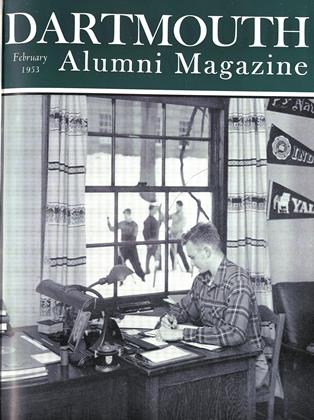Intercollegiate athletic news this past month centered generally around the National Collegiate Athletic Association meetings in Washington and St. Petersburg, and items of interest to Dartmouth alumni came out of both these meetings. At the Washington meetings, William H. McCarter '19, director of athletics at Dartmouth, was nominated for the presidency of the NCAA. For many years Bill has played an important role in the NCAA and has served at one time or another on virtually every major committee of that group. However, in the final vote he lost the election by a narrow 81-72 margin to A. B. Moore, faculty chairman of athletics at the University of Alabama. Bill, however, remains a member of the nine-man executive board of the NCAA.
But the news which attracted the most attention was the NCAA's Rules Committee decision abolishing the two-platoon system of football. The new rule, which becomes effective next fall, states that a player withdrawn in the first or third periods of the game cannot return to the game during those periods. Players withdrawn during the second and fourth quarters of play before the final four minutes of the period, may go back into the game during the final four minutes.
As a member of the powerful NCAA Rules Committee and as secretary-treasurer of the American Football Coaches' Association, Dartmouth's Tuss McLaughry probably had as much to do with putting the new substitution rule through as anyone in the NCAA. A long-time advocate of one-platoon football and justly famous for his "eleven iron men" team at Brown, Tuss had this to say about the matter: "The basic philosophy of the two-platoon system has been all wrong. It's like having a team of hitters and a team of fielders in baseball. Now we'll go back and play the game of football like it was played for 75 years and the way it ought to be played. Coaches will have to adjust. They can't follow the line of least resistance any more. They'll have to get busy and develop boys who can play both ways."
 View Full Issue
View Full Issue
More From This Issue
-
 Article
ArticleThe First Five Years
February 1953 By JAMES P. POOLE '28h, -
 Article
ArticleTHE NEW FRONTIER
February 1953 By JOHN HURD '21 -
 Class Notes
Class Notes1918
February 1953 By ERNEST H. EARLEY, DONALD L. BARR -
 Class Notes
Class Notes1929
February 1953 By F. WILLIAM ANDRES, EDWIN C. CHINLUND -
 Class Notes
Class Notes1928
February 1953 By OSMUN SKINNER, JOHN PHILLIPS -
 Class Notes
Class Notes1908
February 1953 By GEORGE E. SQUIER, LAURENCE M. SYMMES, ARTHUR B. BARNES
Cliff Jordan '45
-
 Sports
SportsCross-Country
October 1952 By Cliff Jordan '45 -
 Article
ArticleSwimming
March 1954 By CLIFF JORDAN '45 -
 Article
ArticleSquash
February 1955 By Cliff Jordan '45 -
 Article
ArticleSkiing
February 1956 By CLIFF JORDAN '45 -
 Article
ArticleSkiing
January 1960 By CLIFF JORDAN '45 -
 Article
ArticleFreshman Spring Sports
May 1961 By CLIFF JORDAN '45
Sports
-
 Sports
SportsTAFT FINALIST IN INTERCOLLEGIATE GOLF
August 1924 -
 Sports
SportsNew Line Coach
April 1945 -
 Sports
SportsGOLF
June 1950 By Francis E. Merrill '26 -
 Sports
SportsGolf
May 1951 By Francis E. Merrill '26 -
 Sports
SportsSPRING FOOTBALL
June 1948 By Francis E.Merrill '26 -
 Sports
SportsHAS MADE GOOD START
February 1941 By R. H. Britton Jr. '42

